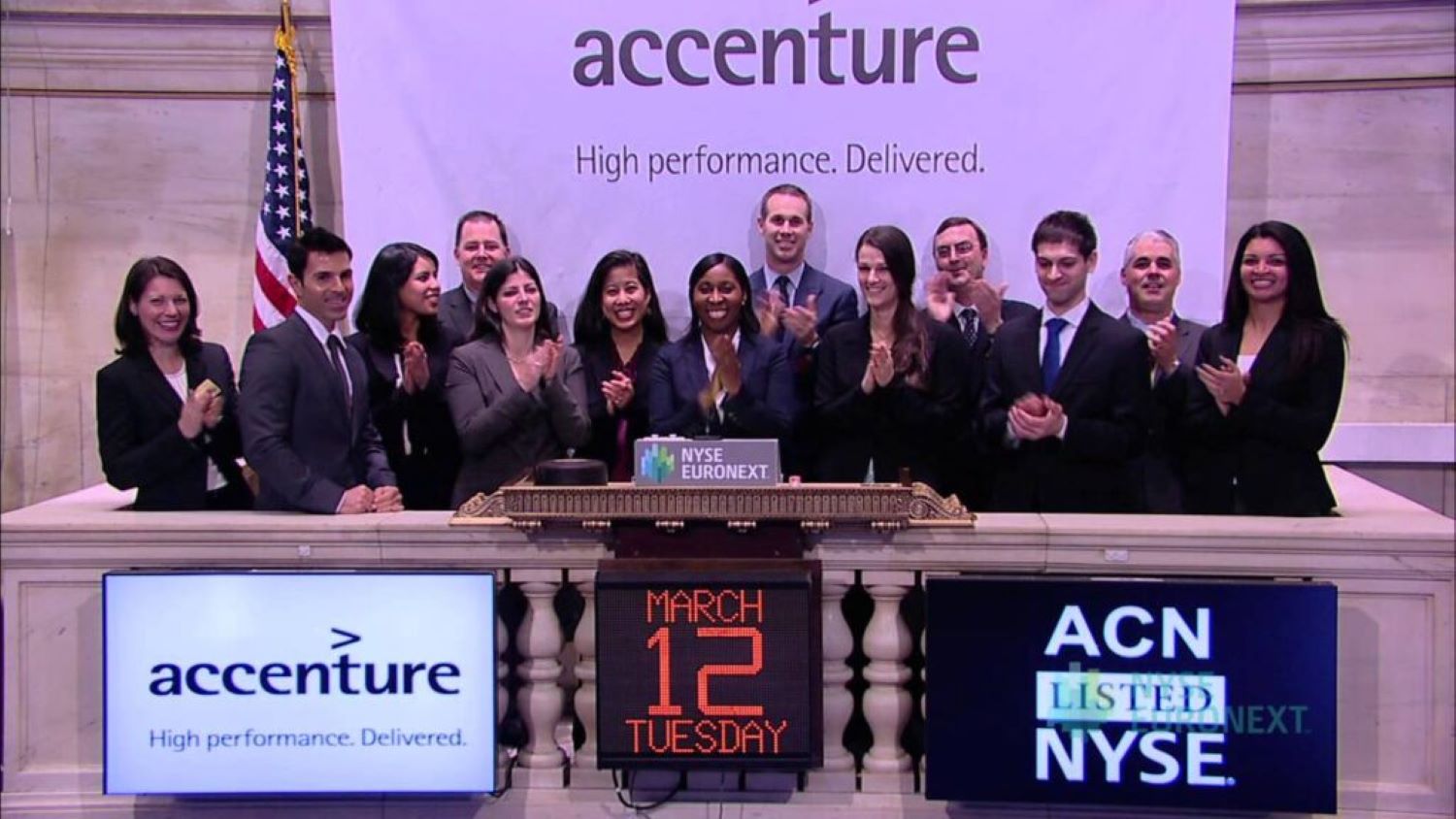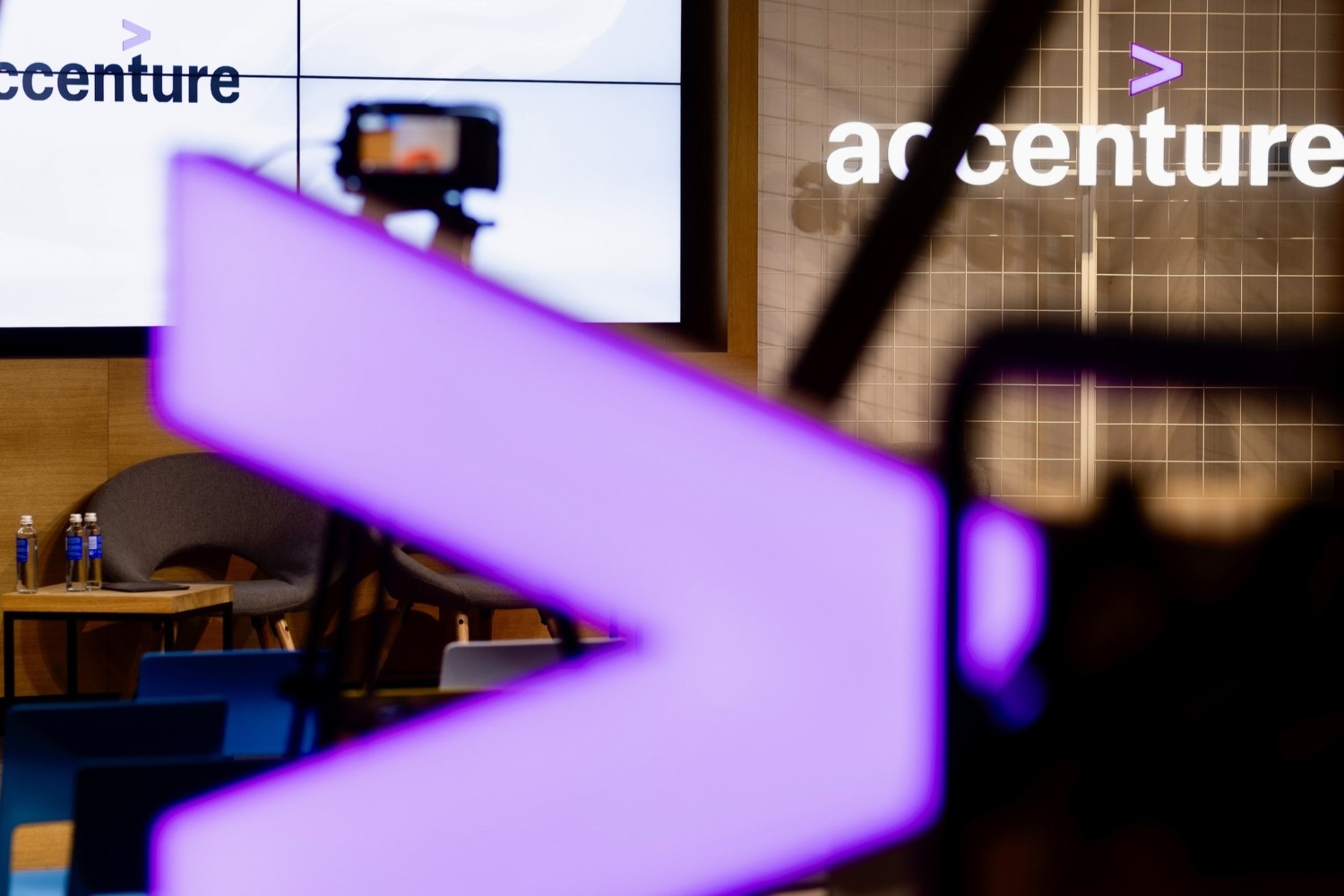Accenture: A Consulting Giant’s Bumpy Ride Through Controversies
The consulting industry plays a crucial role in the business world by offering expert advice and services to organizations aiming to enhance their operations, strategy, and technology. Accenture, a leading firm in this sector, distinguishes itself with its emphasis on technology, strategy, and operations consulting.
Accenture serves over 75% of the Fortune Global 100 and Fortune Global 500 companies, partnering with major corporations like Adobe, Amazon, and Microsoft.
The story of Accenture is closely linked to the rise and fall of an infamous accounting firm: Arthur Andersen. To fully grasp Accenture’s journey, it is essential to first explore the early days of Arthur Andersen.
The Quiet Rise of a Secretive Business
In the early 1950s, Arthur Andersen was a well-respected accounting firm. But later, they became infamous because of the Enron scandal. Arthur Andersen was supposed to check Enron’s finances but missed the fact that Enron was lying about making billions of dollars.
Estimates suggest Enron might have overstated its revenue by up to $100 billion. Because of this, Arthur Andersen’s reputation was ruined, and the firm eventually went out of business. This bad history affects Accenture, which grew from Arthur Andersen’s consulting branch, but it’s worth giving them a fair chance.
Also in the early 1950s, Arthur Andersen helped GE by installing a huge computer at one of their offices, which was the first commercial computer use in the US. This made Arthur Andersen a pioneer in technology. Joseph Glickauf, who led this project, later became known as the father of computer consulting.
For almost 40 years, Accenture was just a part of Arthur Andersen, doing tech consulting. Back then, the tech industry was small, so it was okay to be a division. But by the late 1980s, the tech world had grown a lot, with big tech companies and billionaires.
In 1989, Arthur Andersen made Andersen Consulting a separate company, but both were still run by the same parent company, Andersen Worldwide Societe Cooperative.

This caused problems because Andersen Consulting was growing quickly, while Arthur Andersen was not. Andersen Consulting also had to give 15% of its profits to Arthur Andersen each year, which they didn’t like. By 1998, these issues led to a major conflict.
Andersen Consulting stopped paying Arthur Andersen the 15% share of profits and put the money in escrow, saying Arthur Andersen had broken their contract. After a long process and paying $1.2 billion, they agreed to separate in August 2000.
As part of the split, Andersen Consulting had to change its name and couldn’t use the Arthur Andersen brand anymore. They picked the name “Accenture,” which was suggested by a Danish employee and meant “Accent on the future.”
Accenture officially changed its name on January 1, 2000, and went public on July 19, 2001. This was just before the Enron scandal became a big issue. Some people think Accenture might have seen the trouble coming, but what’s clear is that they were now on their own and ready to grow.
Understanding the Essence of a Consulting Firm like Accenture
When people think of consulting firms like Accenture, they usually picture strategic advice and cutting-edge solutions. But behind the scenes, Accenture plays a dual role that’s less flashy but just as important. Their consultants often handle what we can call “busy work” and “dirty work.”
Handling a Company’s Busy Work
Starting with the busy work, Accenture provides services across eight key areas: financial services; communications, media, and technology; healthcare; energy, utilities, and resources; public services; products, retail, and automotive transportation; and travel.
Their work includes tasks such as improving supply chain efficiency, developing technology products, leading recruitment efforts, and updating outdated systems.
For instance, in 2017, Accenture was hired by Apple to create an enterprise version of iOS. That same year, they helped Customs and Border Protection recruit 7,500 officers. More recently, they secured a $380 million contract to modernize the IT infrastructure for US Customs and Border Protection.
Essentially, Accenture handles the complex, behind-the-scenes tasks that large companies and institutions prefer not to manage internally. However, outsourcing this work is often very costly, as consulting firms typically charge a premium for their services.

A clear example of Accenture’s costly services is their hiring effort for US Customs and Border Protection (CBP). Accenture charged $40,000 for every officer they successfully recruited, a cost often higher than the officers’ annual salaries.
Taking on a Company’s Dirty Work
However, consultants have sometimes been involved in highly problematic practices throughout history. Their advice has occasionally led to major corporate missteps, financial scandals, or ethical controversies.
For example, Sundar Pichai, CEO of Google, is facing a tough decision about laying off 12,000 employees. He might bring in consultants from Accenture for advice. Consultants often give recommendations that match what the client wants to hear, which can make them a useful scapegoat.
If the layoffs turn out to be a bad decision, Pichai can say he was against them but felt pressured to follow Accenture’s advice. If the layoffs go well, he can take credit for making the hard choice and show off his leadership skills. This situation shows how consultants can be used to make tough and controversial decisions seem easier.
Historically, consultants have given advice that led to major financial problems. For example, during the unprecedented credit boom of the past decade, McKinsey advised many major banks to securitize mortgage assets. This advice contributed to the 2008 financial crisis, as the consultants actively promoted this risky practice.
Also, McKinsey advised Purdue Pharma to offer rebates for opioid overdoses, which has been criticized for exacerbating the opioid crisis.
These reflect common practices across the entire consulting industry, whether it’s Accenture, Bain & Co., BCG, McKinsey & Co., EY, Deloitte, PwC, or others. This isn’t necessarily the fault of the consulting firms themselves. Major companies like Apple and Google, with vast resources, often outsource management or engineering tasks to avoid handling them directly.
Consulting firms understand this reality and are unlikely to change their practices for ethical reasons, especially since their business model remains highly profitable. However, increased public and regulatory scrutiny could prompt changes. For example, such pressures led Accenture to move its headquarters from Bermuda to Ireland, as mentioned above.
Major Controversies and Ethical Issues Faced by Accenture
While known for its expertise and innovative solutions, the company has faced scrutiny for various practices that raise ethical questions.
Accenture’s Tax Avoidance Practices
Tax avoidance practices involve companies using legal methods to pay less in taxes. There have been some questionable practices surrounding Accenture almost since its inception.
For example, even though Accenture was part of an American accounting firm for almost 50 years, they decided to set up their company in Bermuda, a place known for low taxes. They originally started in the US, but moving to Bermuda was clearly meant to cut their tax payments.

In the early 2000s, Accenture faced media criticism for being one of the largest public companies based in Bermuda, which drew attention to their tax strategies.
To address the backlash, they later re-incorporated in Ireland, which appeared more favorable while still allowing them to maintain substantial tax advantages.
“A member of the European Union, Ireland offers a sophisticated, well-developed corporate, legal and regulatory environment,” Accenture Chief Executive William Green said in a statement.
A company spokesman said Accenture is moving due to ongoing criticism of companies incorporated in Bermuda.
Several large companies based in Bermuda and the Cayman Islands are considering relocating to Europe, hoping for better tax treatment and other benefits. This move comes as U.S. legislation is set to tighten rules that currently allow firms to defer tax payments on overseas profits if those earnings are reinvested into foreign subsidiaries.
By 2012, reports showed that Accenture managed to cut their tax bill to less than 3.5%. While these tax-saving methods are legal, they raise questions about whether it’s right or fair for a big public company to lower their tax payments so much.
Toxic Work Culture Allegations
Accenture is known for its high-performance work culture, which emphasizes thinking and efficiency. On the surface, Accenture seems like a diverse workplace and ranks well on diversity lists.
Accenture has been recognized as a top 10 Great Place to Work for 2022 in six countries: Argentina, Brazil, France, Japan, the Philippines, and the United States. However, underneath that, it also brings substantial downsides.
The controversy surrounding Accenture typically revolves around criticisms of its work culture and business practices. Common issues include allegations of overwork, underpayment, and unethical management practices. Employees often report long hours and excessive workloads that exceed legal limits, contributing to burnout and dissatisfaction.
For example, one tech worker described being hired at a lower salary due to desperation after COVID-19 unemployment. They found that negotiating salary was challenging and felt underpaid. The high workload, lack of real perks, and stressful environment were significant drawbacks, with a work-life balance often neglected.
In 2021, the Tokyo Labor Bureau sent a report to the Tokyo District Public Prosecutors Office about Accenture Japan Ltd. and its senior manager, accusing them of breaking labor laws. The bureau suspects that Accenture made one of its employees work too many overtime hours.
According to the report, a software engineer at Accenture’s Tokyo office worked 143 hours and 48 minutes of overtime in January 2021, which is well beyond the legal limit of 40 hours a week.
Accenture does not have labor unions, but they had an agreement under Article 36 of the labor law, which allows some overtime but sets a limit. The Tokyo Labor Bureau said this agreement was invalid due to some legal issues.
The bureau’s investigation found that several employees were working illegal amounts of overtime. Accenture, which had about 18,000 employees at the end of 2021, said they accept the findings and are committed to improving their work practices to follow the law.
As companies face major disruptions, they need to rapidly rethink their workforce strategies and reimagine the employee experience (EX). The pandemic has increased the number of available workers, but there’s a lack of specific skills, pushing companies to reevaluate what they offer to employees.
Organizations that prioritize enhancing their “EX Factor” will be better positioned to attract and keep top talent, lower service costs, and improve their operational flexibility. For Accenture, this means focusing on creating a more engaging and supportive work environment to stand out in a competitive job market.
Kickbacks and Manipulated Bidding Practices
In addition, Accenture has been involved in a legal dispute with the U.S. government over false claims for payment on several IT contracts.
In 2011, Accenture LLP has agreed to pay $63.6M to settle a lawsuit with the U.S. government, according to the Justice Department. The lawsuit, filed in Arkansas, claimed that Accenture falsely billed the government for various IT contracts.
The company settled allegations that it received kickbacks for recommending certain products, inflated prices, and rigged bids on federal IT contracts.
“Kickbacks and bid rigging undermine the integrity of the federal procurement process,” said Tony West, Assistant Attorney General for the Justice Department’s Civil Division. “At a time when we’re looking for ways to reduce our public spending, it is especially important to ensure that government contractors play by the rules and don’t waste precious taxpayer dollars.”
The lawsuit was first filed by whistleblowers Norman Rille and Neal Roberts. They used the qui tam provisions of the False Claims Act, which allow private individuals to sue on behalf of the government and get a share of the settlement. The exact amount they will receive from this case hasn’t been decided yet.
“Companies profiting off the breach of their government contracts will pay,” said Brian D. Miller, General Services Administration Inspector General.
The case was managed by the Justice Department’s Civil Division and the U.S. Attorney’s Office for the Eastern District of Arkansas, with help from several federal agencies, including the Defense Criminal Investigative Service and the Offices of Inspector General for various departments.
Since January 2009, the Justice Department has recovered over $7.5 billion in False Claims Act cases.
US Immigration Recruitment Failure: Accenture’s $297 Million Misstep

In June 2018, Accenture was awarded a $297 million contract to recruit 7,500 officers for Customs and Border Protection (CBP). Under this contract, Accenture charged nearly $40,000 per hire, which was more than the average annual salary of a CBP officer.
However, by December 2018, a report from the Department of Homeland Security’s Office of Inspector General revealed serious issues with the contract’s execution.
Customs and Border Protection ended its $297 million contract with Accenture. The decision came after it became clear that the company’s performance fell well short of expectations.
As of December 2018, Accenture had processed only 58 applicants, with just 22 actually getting hired, despite being tasked with recruiting a much larger number. With 3,500 applicants still in the pipeline, CBP decided to transfer these cases to its own hiring center to complete the process.
Initially, Accenture was retained for certain services like marketing and applicant support, but ultimately, the entire contract was terminated “for convenience,” meaning both parties agreed to part ways without assigning blame.
CBP paid Accenture around $19 million for start-up costs and approximately $2 million for the 58 hires. The agency also has about $39 million remaining to settle with Accenture, though the exact amount is still undetermined.
The agency reduced Accenture’s contract from $297 million to $83 million and issued a partial stop-work order. Officials stated that a decision on whether to cancel the remaining part of the contract would be made in March.
Rep. Bennie Thompson (D-Miss.), chairman of the House Homeland Security Committee, expressed concerns, stating that the issues with the contract “reinforce my doubts” about the leadership at Customs and Border Protection (CBP). He added, “CBP cannot simply farm out its hiring and spend hundreds of millions without addressing systemic problems at the agency.”
Deirdre Blackwood, an Accenture spokeswoman, responded by saying, “We remain focused on fulfilling our client’s expectations under our contract.”
A Homeland Security official defended the contract, emphasizing the importance of innovation: “You’ve got to be willing to innovate and try things. … In no way, shape, or form was there fraud, waste, or abuse.”
Meanwhile, Immigration and Customs Enforcement (ICE) canceled a similar hiring contract with the same pay structure as Accenture’s last May, citing delays in hiring and limited funding from Congress.









